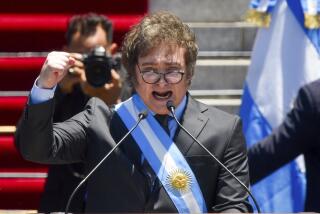Alfonsin Steps Aside
- Share via
Argentina’s President Raul Alfonsin made a difficult but courageous decision in choosing to resign so that a popularly elected civilian successor can take office earlier than planned.
Ever since Alfonsin’s Radical Party was overwhelmingly defeated by Peronist candidate Carlos Menem in last month’s national election, Argentina has been paralyzed politically. The severe economic crisis that provoked an overwhelming majority of Argentine voters to turn out the Radicals in favor of the Justicialist Party, as the Peronists are officially known, is getting worse, and no one in Alfonsin’s government seems capable of coping with it. The seven-month transition period decreed by the nation’s constitution left Alfonsin a weak lame duck, blocking Menem from putting populist economic programs into action. Frustration with runaway inflation finally exploded in widespread food riots that left 14 people dead.
The rioting persuaded Alfonsin that he should leave early, telling his fellow citizens on television Monday night that “no president has the right to endlessly demand the sacrifice of his people . . . “ The decision was affirmed Tuesday by Menem, who said he will assume office on the date Alfonsin set for his departure, June 30.
Alfonsin’s announcement was the last important decision of a president likely to be judged more kindly by history than by his contemporaries. In the last two years, he has been criticized, perhaps justifiably, for failing to impose the harsh austerity measures that traditional economists say Argentina needs to control inflation and resume economic growth. He also endured three tense standoffs against military factions seeking to overthrow him, and one leftist terrorism incident.
These tarnished Alfonsin, the man who helped revive Argentine democracy after an especially dark era, taking over from a military junta that waged a brutal, “dirty war” against its own people and launched a futile invasion of the Falkland Islands. He became the first civilian leader in Latin American history to prosecute military leaders for human-rights violations, an important precedent that Menem has hinted he may abandon. The president-elect wants to be on good terms with Argentina’s restive military, and has hinted that he may halt the practice of judging former military leaders for alleged crime committed on their commands. That would be disastrous, and would simply reinforce the arrogant attitude among many officers that they know what is best for Argentina.
To his credit, Alfonsin believed to the end in the dictum that it is not the officers but the people who know best in a democracy, stepping down when it became clear that popular opinion would no longer tolerate him in office. A Radical Party colleague once said that Alfonsin is “almost too much of a democrat.” That is a fitting political epitaph for his presidency--one in which Alfonsin can take pride.
More to Read
Sign up for Essential California
The most important California stories and recommendations in your inbox every morning.
You may occasionally receive promotional content from the Los Angeles Times.













